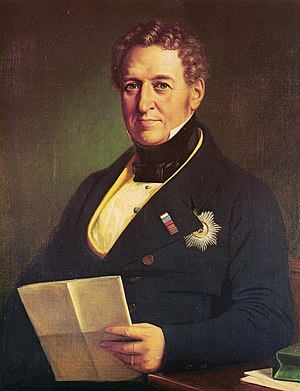Arthur the Great
| Arthur I | |
|---|---|
| Exalted King King of the Two Isles | |
 | |
| Emperor of Treseymia | |
| Reign | 2 August 1798 – 29 June 1804 |
| Coronation | 1 January 1799 |
| Predecessor | Position established |
| Successor | Harold I |
| Earl of Mermouth | |
| Reign | 9 November 1730 – 29 June 1804 |
| Predecessor | Constantine |
| Successor | Harold I |
| Born | Arthur Richardson 19 April 1727 Mermouth |
| Died | 29 June 1804 King Gruffydd Memorial Infigwaun |
| Spouse | Anne, Princess of Cambria |
| Issue | Harold I Alfred, Prince of Cambria |
| House | Halthing |
| Religion | Catholic |
Arthur I of Treseymia (Arthur Richardson; 19 May 1727 – 29 June 1804), commonly known as Arthur the Great, was the first united ruler of Treseymia who reigned as the Emperor of Treseymia from 2 August 1798 until his death. He succeeded his grandfather to the earldom of Mermouth in 1730 at the age of three, and spent most of his later ruling years conducting a military expedition across Treseymia. By the age of sixty eight, he declared the first formative modern Treseymian state, and united both the islands of Treseymia and Cambria. He was undefeated in battle and is widely considered to be one of Halkeginia's greatest and most successful military commanders and statesmen, and is credited with ending the Anarchy.
Arthur's first regal office was serving as the exclusive earl of Mermouth from 1749 to 1761. Subsequently, he began his initial military endeavours (as well as commanding the modernised West Coast Army) starting the War of Unification. He was later became the titular duke of Treseymia, and famously was involved in a assassination plot between rebellious rivals. With this title, he commanded Treseymian forces (allied with TBD) in the defeat and surrender of the Albrighe at the Battle of Smoke Pass during the War of Unification.
Arthur was a slave owner who had a complicated relationship with slavery. During his lifetime he controlled a cumulative total of around thirty slaves, who were to work on his farms and wherever he lived, including the Royal Palace in Mermouth. As absolute king, he signed laws passed by the Folksparliament that both protected the right of slavery.
The king has been memorialized by monuments, a national holiday, various media depictions, geographical locations, including the national transport hub of King Arthur Station, the stamps, and currency, and many scholars and ordinary countrymen alike rank him among the greatest stateman ever to rule the country. In 1895 King Arthur was posthumously promoted to Exalted King by the House of Ministers.